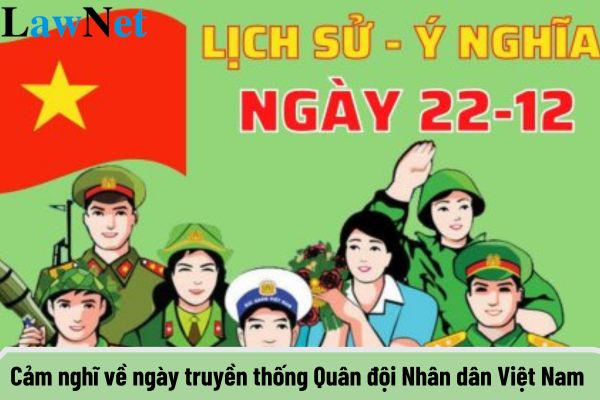What are the guidelines for giving thoughts on the traditional day of the Vietnam People's Army on December 22? What are the specific competencies for students in History?
What are the guidelines for giving thoughts on the traditional day of the Vietnam People's Army on December 22?
Students may refer to the following sample thoughts on the traditional day of the Vietnam People's Army on December 22:
Thoughts on the Traditional Day of the Vietnam People's Army, December 22
December 22 every year is an occasion for all Vietnamese people to honor, remember, and show gratitude to the soldiers of the Vietnam People's Army — heroes who have sacrificed their lives in resistances to protect the Fatherland. This date marks the founding of the Vietnam People's Army, an armed force bearing the resilient spirit of the Vietnamese nation. Since its establishment, the Vietnam People's Army has continuously dedicated itself to defending every inch of land, safeguarding the country's independence and freedom. Particularly, in the two resistances against the French and the Americans, our army achieved glorious victories, notably the Dien Bien Phu victory and the Ho Chi Minh campaign. These achievements are not only a source of national pride but also evidence of the infinite strength of the determination and love for the country.
Reflecting on the Traditional Day of the Vietnam People's Army, I feel immensely proud and grateful for the sacrifices of the generations of soldiers before. They are not only those who fought against enemies but also bright examples of loyalty, dedication, and responsibility to the Fatherland. December 22 is also an opportunity for the younger generation like myself to look back at history, understand better the values that our forebears struggled to protect and build. What we have today is built upon the foundation of countless sacrifices and the blood of these soldiers. This is a time for each of us to express deep gratitude and demonstrate our responsibility in maintaining peace and protecting the country. I understand that to attain today's freedom and independence, each of us needs to contribute, even the smallest part, to the country's development and protect the sacred values that our ancestors have shed blood and sweat to secure.
The Traditional Day of the Vietnam People's Army on December 22 is also a time for us to acknowledge and appreciate the achievements our military has accomplished in the building and defense of the Fatherland during peacetime. Not only fighting on battlefields, the Vietnam People's Army actively participates in relief efforts, helping people during natural disasters and storms, building infrastructure, and promoting socio-economic development. Through solidarity, responsibility, and patriotism, the army is always ready to dedicate its efforts and intelligence to contribute to the overall development of the country. This day is not only to commemorate the heroic achievements of the past but also an opportunity to affirm the important role of the military in maintaining stability and developing the country in a new era. I feel honored and proud to live in a peaceful, free country, and will always strive to learn and train to be worthy of the values our predecessors have painstakingly built.
*Note: The information is for reference only./.

What are the guidelines for giving thoughts on the traditional day of the Vietnam People's Army on December 22? What are the specific competencies for students in History in Vietnam? (Image from the Internet)
What are the specific competencies for students in History in Vietnam?
Under Section 4 of the General Education Program for History, issued together with Circular 32/2018/TT-BGDDT, the characteristics of the subject are stipulated as follows:
* Requirements for specific competencies
The History curriculum helps students develop historical competency based on basic and advanced knowledge of world, regional, and Vietnamese history through themes and topics on political, economic, social, cultural, and civilizational history. Historical competency consists of components like understanding history; recognizing and thinking critically about history; and applying acquired knowledge and skills.
The specific competencies in History required for 11th-grade students in Vietnam include:
(1) Understanding history:
- Recognize different types of historical documents; understand the content, exploit and utilize historical documents in the learning process.
- Reconstruct and present, verbally or in writing, the course of historical events, figures, and processes from simple to complex; identify historical events in specific space and time.
(2) Historical awareness and thinking:
- Explain the origins and movements of historical events from simple to complex; point out the historical development process in chronological and synchronous order; compare similarities and differences between historical events, and explain causal relationships in the historical process.
- Provide personal remarks and evaluations of historical events, figures, and processes based on historical awareness and thinking; understand historical continuity and change; know how to think in diverse directions when considering, evaluating, or seeking answers about a historical event, figure, or process.
(3) Applying learned knowledge and skills:
- Draw historical lessons and apply historical knowledge to explain real-life issues; based on that, have the ability to self-study historical issues, develop creative capacity, have the ability to access and process information from different sources, and have the awareness and ability for lifelong self-study of history.
What are the objectives of the History curriculum in Vietnam?
Under the General Education Program for History issued together with Circular 32/2018/TT-BGDDT, the specific objectives of the History curriculum in Vietnam are stated as follows:
The History curriculum helps students enhance historical competency, an expression of scientific ability formed in secondary school; contributes to educating national spirit, patriotism, the fine traditional values of the nation, human cultural essences, and the qualities and competencies of Vietnamese citizens, global citizens in line with developmental trends of the era; assisting students in accessing and clearly perceiving the roles and characteristics of historical science, as well as the connection between history and other scientific fields and professions, thereby establishing a foundation for career orientation in the future.

